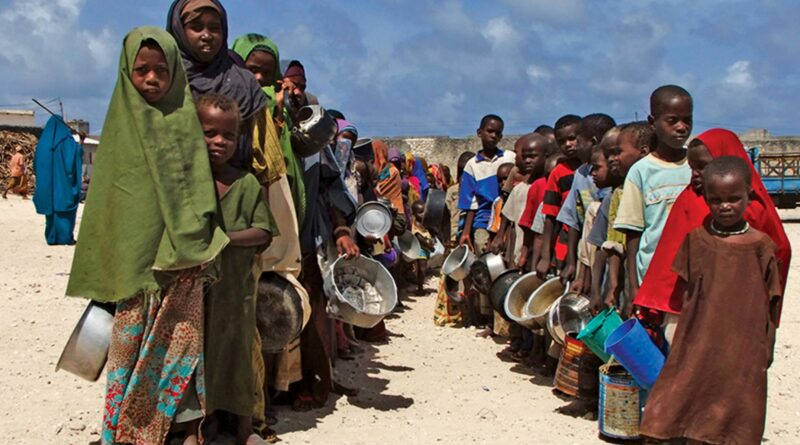Why the UN Is Seeking $396M Fund to Avert Humanitarian Crisis in Northern Nigeria

In a dire call to action, the United Nations (UN) has declared that immediate intervention is crucial to salvaging a catastrophic humanitarian crisis in Nigeria’s Northeast region.
The UN Office for the Coordination of Humanitarian Affairs (UN-OCHA) emphasized that without urgent measures, only a fraction of the 4.3 million people at risk of food insecurity in the troubled region will receive assistance during the lean season.
The UN has also estimated that a staggering $396 million is urgently required to scale up humanitarian efforts in Borno, Adamawa, and Yobe (BAY) states and avert widespread hunger, malnutrition, and mortality.
Highlighting the severity of the situation, the UN warned that over half a million people could face emergency levels of food insecurity, accompanied by alarming rates of acute malnutrition and increased mortality if swift and significant humanitarian aid is not deployed.
The organization projected that two million children under the age of five in the three states could experience wasting, the most immediate and life-threatening form of malnutrition. Additionally, approximately 700,000 children are at risk of severe acute malnutrition, making them 11 times more likely to die compared to well-nourished children. Immediate action is imperative to ensure their survival.
The UN attributed the deepening food crisis and concerning levels of malnutrition to years of protracted conflict, insecurity, and a range of contributing factors. These factors include fuel and food inflation, a naira cash crisis earlier this year, and climate shocks such as the devastating floods in Nigeria in 2022. These compounded issues have worsened the already dire humanitarian situation.
Mr. Matthias Schmale, the Humanitarian Coordinator for Nigeria, shared firsthand accounts of the distress faced by mothers fighting for the lives of their malnourished infants and children enduring days without sufficient food. He emphasized that millions of food-insecure people in the BAY states could be subjected to this harrowing reality unless urgent funding and resources are mobilized. If additional funding is not secured, only around 300,000 of the 4.3 million individuals in desperate need of food assistance will be reached during the peak of the lean season. Consequently, an increased risk of starvation and death looms over those left unassisted.
With limited resources at hand, nearly 3.4 million people will not receive essential agricultural livelihood support, including farming inputs like fertilizers. Bridging this critical funding gap is crucial to sustain the livelihoods of over 80% of vulnerable individuals across the BAY states, as enabling self-sufficiency in food production is a fundamental aspect of addressing the crisis.
The UN statement revealed that the World Food Programme (WFP) aims to expand its operations and provide emergency food and nutrition supplies to 2.1 million people. The United Nations Children’s Fund (UNICEF) and nutrition partners plan to offer life-saving nutrition services to over one million malnourished children, pregnant women, and breastfeeding mothers.
Additionally, the Food and Agriculture Organization (FAO) intends to distribute seed packages to secure cereal production for the upcoming harvest, aiming to reach two million people. Collaborative efforts between these organizations are crucial to mitigating the unfolding food and nutrition crisis.
Mr. David Stevenson, the Country Representative and Country Director of WFP in Nigeria, emphasized the critical nature of humanitarian assistance at this juncture, given the sheer scale of the food and nutrition crisis.
Ms. Cristian Munduate, the Country Representative of UNICEF in Nigeria, called for concerted efforts to protect children and prevent further suffering. Mr. Fred Kafeero, the FAO representative to Nigeria, warned of heightened food insecurity among vulnerable households without access to agricultural livelihood options during the upcoming lean season. Urgent funding is necessary to provide these households with essential production inputs, livelihood assets, and corresponding skills to save lives, protect livelihoods, and facilitate recovery.
In addition to the food crisis, humanitarian partners are concerned about the potential outbreaks of diseases like acute watery diarrhea, cholera, and malaria, particularly impacting malnourished children, as the lean season coincides with the rainy season.
The UN has released an initial combined funding of $18 million to kickstart the response to the food security and nutrition crisis in Nigeria. Of this amount, $9 million has been allocated from the Central Emergency Response Fund (CERF) by UN Emergency Relief Coordinator Mr. Martin Griffiths, and an additional $9 million will be disbursed from the Nigeria Humanitarian Fund (NHF) by Humanitarian Coordinator Schmale. However, these funds account for less than 5% of the total required by humanitarian organizations to address urgent food and nutrition needs. Hence, significant additional and early funding is urgently needed to prevent vulnerable populations from plunging further into crisis.
As past experiences have shown, early funding can make a pivotal difference in pulling food-insecure individuals back from the brink. The UN’s appeal underscores the urgency and gravity of the situation, emphasizing the necessity for immediate action to alleviate suffering and safeguard lives in Nigeria’s Northeast.


